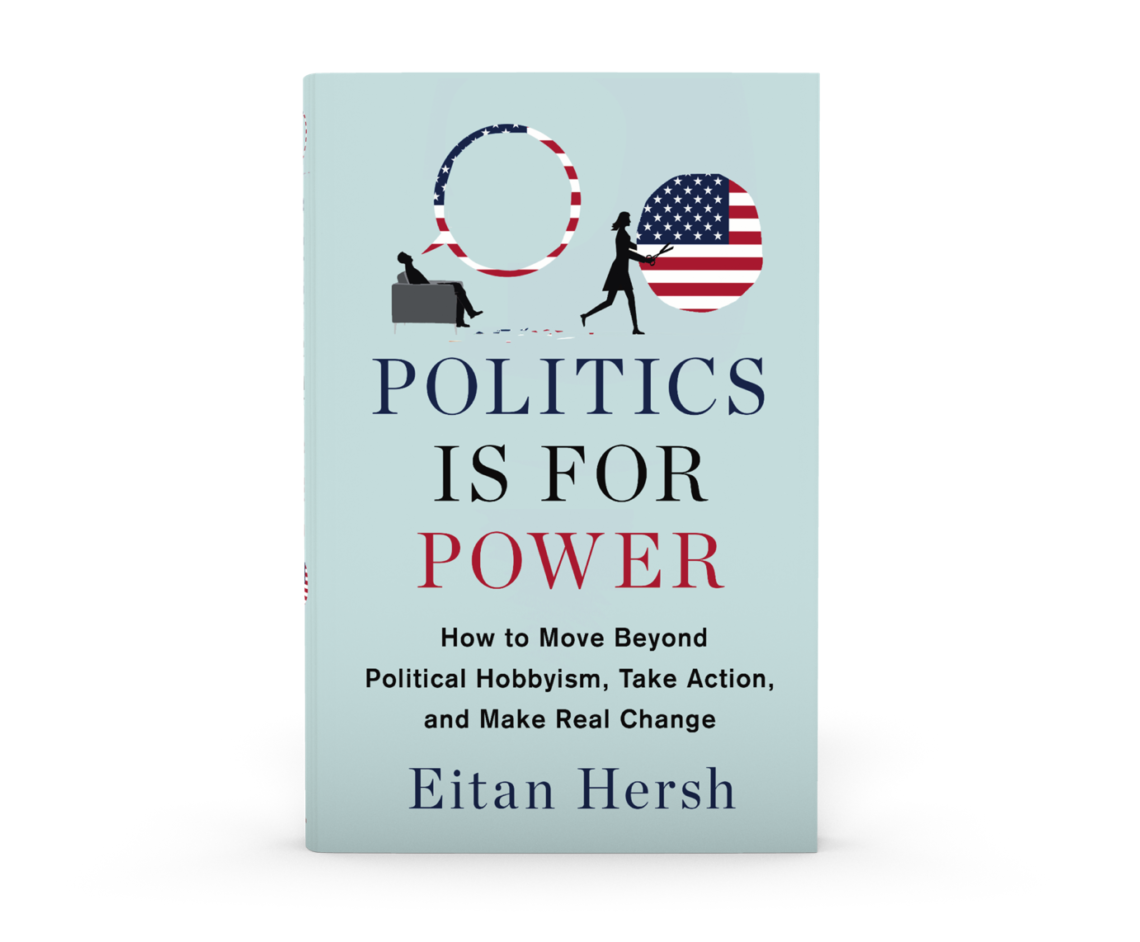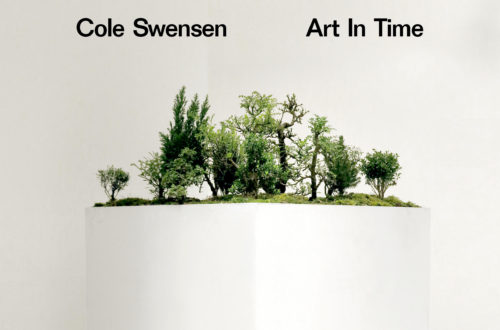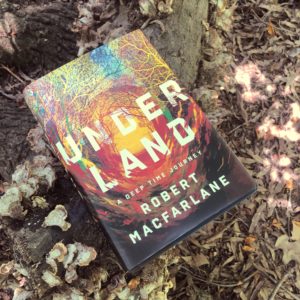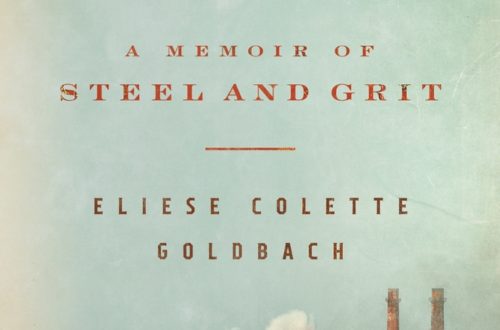
“Politics is for Power: How to Move Beyond Political Hobbyism, Take Action, and Make Real Change by Eitan Hersh” Reviewed by LaVonne Roberts
For anyone wondering how to engage in politics on a community level, Politics is for Power: How to Move Beyond Political Hobbyism, Take Action, and Make Real Change, demystifies the process. Eitan Hersh, who is an Associate Professor in the Department of Political Science at Tufts University, says that when people engage in genuine political work there is only one reason they do that: they want power. Hersh concisely captures the difference between activism and organizing, coining the former as “political hobbyism.”
His research points to the fact that one in five Americans claim to be politically active on a daily basis, but most of what they are actually doing is spectating and commenting, not real politics. If you aren’t trying to obtain political power then you are not really engaged in politics, according to Hersh. Instead, you’re a “political hobbyist.” The real reason that Hersh’s book speaks to you and me is that the author challenges us to reevaluate what we’ve been doing with our time and to ask ourselves if we’re part of the problem or the solution to all that’s wrong in politics.
If you’re the type of person who’s engaged in commenting about politics on Facebook and continually refreshing their Twitter feed, then Hersh says you’re involved in “slacktivism,” a catch-all term for consuming and participating in politics online. He opines that is is not because of gerrymandering, Citizens United, cable news, or any of the other common scapegoats that our system is broken, but because of us: ordinary people who are doing politics the wrong way.
Hersh explains that the problem is that hobbyism is replacing other forms of participation, like organizing on the ground—on a community level, at a local party chapter, or anywhere where actual humans interact. Hersh describes how many of us, mainly white, educated liberals, engage in politics in a way that doesn’t solidify with our political goals. Instead of just focusing on the clearly defined problem of political hobbyism, Hersh tells the stories of people who have amassed real political power on a grass-roots level—Latinas in Massachusetts, moms in rural Pennsylvania, and students in North Carolina.
The first section defines political hobbyists in more details as people who obsessively follow political news, share and comment on social media, and very conspicuously vote in national elections, but are less involved in local politics. They even donate to political causes and campaigns, but more for self-gratification and literally for selfies than for actual concrete change.
The second section explains the dangers of political hobbyists: our time would be better spent actually accruing power and making real change, and we increase polarization. He is an admitted political hobbyist, so his criticism is more comfortable to swallow. Perhaps what is most compelling is the way Professor Hersh uses data science and research to proactively nudge the reader to embrace their power to be a catalyst. He points out that the 2014 midterms had the lowest level of voter participation in over 70 years and tells us why college students lie on surveys when asked whether they voted.
Politics for Power is not just a necessary read; it’s a book that should be a part of civics class in young adult’s education. This is a book about doing rather than complaining—a road map for local political organizing and volunteering. Writing a check to a political cause is easy, but without real involvement, it’s a shallow investment that leaves the donor unfullfilled. Hersh asks the reader to dig deeper to define what really matters in our lives and then to counter with meaningful Action.
Eitan Hersh received a PhD from Harvard University in 2011. He served for six years on the faculty of Yale University as assistant professor of political science and resident fellow of the Institution for Social and Policy Studies before becoming a tenured associate professor of political science at Tufts University. His peer-reviewed articles have been published in the major political science journals. Hersh is the author of Hacking the Electorate and Politics is for Power.

Interview with Eitan Hersh
Eitan Hersh, Tufts Political Scientist, and author of POLITICS IS FOR POWER: How to Move Beyond Political Hobbyism, Take action, and Make Real Change, asserts that “if you feel unfulfilled, melancholy, paralyzed by the sadness of the news and depth of our political problems, there is an alternative: actually doing politics.” Hersh illustrates the difference between activism and organizing, calling the former “political hobbyism,” through four well-told and inspirational stories of grassroots organizers building communities of like-minded citizens facing similar struggles, who aim to enact political change. His research reveals that while many Americans spend significant amounts of time on politics – a third report spending as much as two hours a day-–most of what they are actually doing is spectating and commenting, not real politics. Hersh believes that citizens who want to empower their political values would be better off if they spent less time-consuming politics as at-home amateurs and more time helping to strengthen organizations and leaders.
What was your motivation to cast the American political or political-adjacent public as a linear hierarchy? In each tier, some people vote, and some don’t. I’m curious if you think that all eligible voters fit into this hierarchy.
EDH: In simple terms, there are a lot of Americans who aren’t that interested in politics. Maybe they’ll vote in a presidential election, but they mostly stay out of political discussions and generally abstain from participation. They are crucial to politics because they aren’t as set in their views as more engaged citizens. Also, there are so many voters like this. Those voters could really make a difference if a candidate or party could win some of them over.
The next tier of the hierarchy are citizens who follow politics, frequently vote, but generally engage in politics as hobbyists from the sidelines. My book is written for these people, with the aim of helping them see a path to doing real politics (working with others, with goals and strategies, to influence the government), not just doing hobbyism. Doing real politics means that the folks in this middle tier need to earn the respect and the votes of the folks in the bottom tier.
There’s also an upper-tier – politicians, donors, party leaders – who can direct resources to building grassroots movements.
Of course, these tiers are a simplification. There’s plenty of overlap in these groups.
You point out that when politics is about empowerment, community service and political engagement are intimately connected. Civil rights activists have protested against “Stop and Frisk,” a New York City Police Department program that has led to the stops and searches of hundreds of thousands of New Yorkers, targeting minority communities for years. Civil-rights activists were ecstatic when a federal judge declared the NYPD’s policy unconstitutional. Recently, Bloomberg apologized. Is this the type of local activism you envision?
EDH: Sure. I’m not familiar with the details of this case, but it sounds like groups organized effectively to solve a concrete problem that people were having with the government. A policy change like this, even one settled by a court, doesn’t just happen. It requires a lot of organizing and work.
In your book, you assert that our collective treatment of politics as a sport incentivizes politicians to behave badly. Most Americans follow our President’s day-to-day machinations like a reality show, yet are apathetic when it comes to engaging in politics. If your book could inspire one immediate change with regards to political engagement, what would that be?
EDH: The immediate change I’m hoping to inspire is a kind of paradigm shift. A lot of people think of their own role in politics as pretty meaningless. They do nothing but follow the news because what else are they supposed to do? They can’t influence what’s happening in Washington. In a presidential election, their vote is just an invisible drop in the bucket. The paradigm shift is to do away with that line of thinking. Political participation is not about any person having an influence over events in Washington, but about increasing the power of one’s own vote or voice. The volunteer organizers I profile each have the one vote they are entitled to as citizens, just like the rest of us. But they think: how many more votes can I get? Do I have it in me to earn the respect of 10 people, 100 people, 1000 people who will vote or advocate with me? The main change I want to inspire in folks who are wasting hours every week in news consumption is that they have a role to play, and real political action isn’t dirty, it isn’t beneath them, it’s what they are supposed to be doing.
Behavioral science and data inform much of your work. How is data changing the way political scientists like yourself approach political messaging and the way politicians engage with their constituents?
EDH: This book is mostly a big-picture theory of American politics. It’s taking a step back from the individual studies, from the statistical hypothesis-testing that other political scientists and I do, and instead focusing on general patterns of behavior. However, the big picture is so much clearer because of the explosion of data – surveys, public records, experimental data, commercial data – that gives us a better understanding of the nitty-gritty of human behavior than we ever could grasp before.
How can local community members use data science to hold the media and politicians to higher standards?
EDH: Politicians have become really nationalized. Most citizens who care about politics only seem to care about what’s going on in Washington. That leaves state and local politicians in many places with not much pressure from citizens to solve important policy problems that citizens say they care about. On top of that, state and local politicians often don’t have great information about policy changes that might work for their communities. If citizens can redirect the energy they waste following the national drama, I think they would find lots of ways to help inform state and local political debates with data and analysis they get from academics, news sources, or that they put together on their own.
You point out that political hobbyism is found in all circles, but it is mainly a problem for people who are well educated and on the political center and left. You state that less than 5 percent of Americans had a degree in 1940, whereas over 30 percent do today. Still, today’s college graduates have become less likely to see themselves as unique, as responsible for their communities, as trustees, getting involved, and encouraging others to do the same. Is this group who you hope your book will most impact?
EDH: The book is designed for the hobbyist – the person spending time on politics but without purpose and direction. To the extent that hobbyists are disproportionately found in the ranks of college-educated, I suppose that’s the audience I’m targeting. But hobbyists are found in all communities, college-educated and not, young and old, and so forth, and so I don’t think the book is just for any one subset of the population.
I would say that the book is also designed for organizers and folks already spending time trying to cajole their hobbyist friends into action. I hope this is the book they can give to those friends that help provide the language (and data) for why political hobbyism is so problematic and terrible!
Most liberals like to point to the fact that the more education an individual has, the more likely they are to vote as a Democrat. Your research reveals that a large percentage of college-educated Americans lie on surveys about whether they voted. Is that behavior equal between conservatives and liberals?
EDH: I think so. The most compelling theory about why so many people who don’t vote lie about it on surveys is that they are in a social network where they feel they should have voted. If you are in a social network where people talk politics, expect you to know what’s going on in the news, and think of voting as a civic duty, then you’ll lie about voting when you don’t vote. The liars are consistently college-educated, seemingly politically-engaged people of both parties.
You write that “today, an American who is white, college-educated, and interested in politics is 60 percent more likely to identify as a Democrat than a Republican. They spend more of their leisure time consuming political information than those without a college degree and less time than racial minorities volunteering for political organizations.” It seems like your research points to the fact that Americans who have something to fight for are most engaged. If so, then what hope is there to move beyond complacency in a favorable economy?
EDH: Well, there are a lot of people who believe, even if their own economic situation is okay, that the country is on the wrong track. Maybe they’re worried about the stability of our democracy. Perhaps they’re worried about the future and the prospects of their own children or grandchildren, about the health of the planet. My hope is that more of those people stop agonizing about problems from the couch and actually take their roles seriously as stewards of their community and country.
The typical voter does not wish to think through public policy. How can politicians get the “typical voter” more engaged in public policy decisions? Should this be the politician’s responsibility?
EDH: Most voters aren’t interested in the intricacies of public policy. They don’t need to be. They don’t need to weigh every plan or policy when deciding who to vote for. What they need is not just politicians but local leaders in the community and local political party committees showing voters the big picture. Local leaders, mostly volunteers, need to convey to ordinary voters that the leaders care about the voters’ needs, share their priorities, and build trust. That’s what all the organizers in my book do. It’s not about getting disengaged voters to suddenly care about policy details.
Do you have any tips on how writers can write about politics in a way that catalyzes action and de-incentivizes political hobbyism?
EDH: Engaging in politics – working with others to influence the government – isn’t easy. Citizens need help in best-practices for how to engage in politics and, frankly, for inspiration from those who are doing it well. If you’re writing about politics as gossip in Washington or about horse race campaigns, that might be fun to write and read, but it doesn’t help anyone learn how to be an effective citizen.
I’m pretty sure folks who read my book will think the best part of the book is the stories of the organizers – Lisa, Drew, Angela, Naakh, Carol, Querys, and Alicia. These people are so special, but there are many others across the country like them – ordinary volunteer citizens building power – and their stories are rarely told. To me, the lowest-hanging-fruit here is in writing more about people like them.
As you point out, most college students can recite the ins and outs of Special Counsel Robert Mueller’s investigation or fondly recall old 24-hour scandals such as Sharpiegate. Still, they haven’t the faintest idea of how to push for what they care about in their own communities. How does the curriculum need to change in colleges or in high school to connect students to their communities? What else can be done?
EDH: For one thing, I think we need this shift in thinking. Whether you are a student or not, if you are spending your time in politics learning facts, listening to politicians tell war stories, listening to pundits on podcasts, etc., you aren’t engaged in politics at all. You are a hobbyist. We need curricula in high school and college that gets out of the hobbyist mindset. That probably requires a shift away from teaching about how Washington works and toward teaching about the structure and norms of politics in one’s own community.
On college campuses, we need to stop hosting events that focus on horse-race coverage and punditry and start hosting more events highlighting the power-building work of folks like the local organizers in my book. If students see universities prop up pundits instead of people like Querys Matias – the school bus monitor I profile who has built a stunningly successful Latino Coalition in her town – then the universities are propping up the wrong people as heroes and role models.
In 1972, the first year 18- to 20-year-olds were allowed to vote, 55 percent of 18- to 29-year-olds cast ballots. Only 43 percent of that age group voted in 2016. Do you feel that current high school studies are not preparing students for voting responsibility or that the fact that teachers shy away from discussing politics accounts for the complacency you write about in the young adult population? Would allowing teens in school to register to vote before they are 18 make a difference in a more robust voting culture?
EDH: I’d support laws making it easier for teenagers to register to vote, but I don’t think that’s the main solution. When kids register in high school, they often end up moving – to college, to their own home – soon after. In the next few years of life, they’ll move more times. In your late teens and twenties, that’s a pretty nomadic part of life. The nomadic period lasts longer than it used to because of later marriages and later childbirths than in previous generations. What all this means is that young people don’t feel as connected to their communities and willing to invest time and effort into them. In my view, one priority should be helping students channel the energy they have for issues like climate change into local politics rather than into rallies that are focused on national and international reform. They should work on these local issues even if they don’t plan on being in any community forever.
What are you doing differently, if anything, than your parents did to empower your children to engage in politics?
EDH: My own parents showed me a lot about how to invest time in the community and religious organizations and the importance of being informed. At the same time, my parents weren’t themselves political organizers. My kids are still very young – ages 2, 4, and 7 – but I’m trying to show them fun ways to do politics. For example, they’ve gone around with me with a megaphone (megaphones are really fun, for all ages!) to get out the vote in the neighborhood on Election Day. I don’t watch any cable news or listen to political podcasts with my kids. I want them to associate politics with doing rather than observing.
I recently listened to an interview with Alexandria Ocasio-Cortez on Pod Save America. What really stayed with me was her comment that “White people need to organize and have open conversations about race.” In your essay in The Atlantic, you wrote, “Fast-forward to the present day—to a world of increasing inequality in resources, where rich neighborhoods will feature yard signs claiming that everyone is welcome but where zoning rules claim otherwise. If you don’t think there is any work to do in your own town in advancing the cause of racial equality, you are not looking very hard.” How can we engage college students to rise up to AOC’s directive? Should college curriculum engage students on a more local level, introducing them to community activism, rather than focus on national political activism?
EDH: If students want to change the status quo on an issue, teachers can show them how to channel their energy effectively. Whatever the issues are. And typically, that means local engagement.
What do you wish candidates/politicians will take away from your book?
EDH: Candidates and politicians are often frustrated about how hard it is to be effective in government. There are lots of roadblocks to policy change. To make change, politicians would benefit from an electorate that doesn’t just show up on presidential elections but works with leaders to push for long-lasting change. I am hoping the book will give politicians some language that they can share with their supporters that encourages those supporters to participate more effectively than sharing news online.
What type of research are you doing in the future?
EDH: Still up in the air, but my next book might be about the civic role of businesses in the 21st century.
*
Eitan Hersh will be interviewed LIVE on Tuesday, April 14th, at 7:30PM
https://NewSchool.zoom.us/j/361340364




